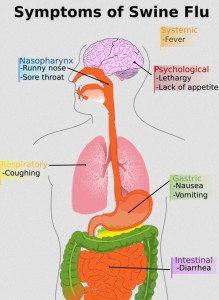 Practical Practitioner
Practical Practitioner
By: Pamela Egan, NP, ABAAHP Diplomat
Swine Flu (H1N1 Influenza) And You
What is Swine Flu and What are its Symptoms?
Is This Swine Flu Virus Contagious?
August 06, 2009 – CDC has determined that this virus is contagious and is spreading from human to human. People with swine influenza virus infection should be considered potentially contagious as long as they are symptomatic and possible for up to 7 days following illness onset. Children, especially younger children, might potentially be contagious for longer periods.
What are the signs and symptoms of swine flu in people?
The Symptoms of Swine Flu in people are similar to the symptoms of regular human flu and include fever, cough, sore throat, body aches, headache, chills and fatigue. Some people have reported diarrhea and vomiting associated with swine flu.
How do you catch swine flu?
Spread of swine flu can occur in two ways:
- – Through contact with infected pigs or environments contaminated with swine flu viruses.
- – Through contact with a person with swine flu.
 Are there medicines to treat swine flu?
Are there medicines to treat swine flu?
Yes. CDC recommends the use of oseltamivir or zanamivir for the treatment and/or prevention of infection with these swine influenza viruses. Antiviral drugs are prescription medicines (pills, liquid or an inhaler) that fight against the flu by keeping flu viruses from reproducing in your body. If you get sick, antiviral drugs can make your illness milder and make you feel better faster. They may also prevent serious flu complications. For treatment, antiviral drugs work best if started soon after getting sick (within 2 days of experiencing swine flu symptoms).
What can I do to protect myself from getting sick?
Cover your nose and mouth with a tissue when you cough or sneeze. Throw the tissue in the trash after you use it. Wash your hands often with soap and water, especially after you cough or sneeze. Alcohol-based hand cleaners are also effective. Try to avoid close contact with sick people. If you get sick with influenza, CDC recommends that you stay home from work or school and limit contact with others to keep from infecting them. Avoid touching your eyes, nose or mouth. Germs spread this way.
Vitamin D and the mineral zinc have been shown to help boost the immune system and thus help protect against the flu, particularly when taken as part of a nutritional supplement regimen also consisting of probiotics.
What should I do if I get sick?
If you are sick, you should stay home and avoid contact with other people as much as possible to keep from spreading your illness to others. If you become ill and experience any of the following warning signs, seek emergency medical care.
Swine Flu Symptoms:
In children emergency warning signs that need urgent medical attention include:
- – Fast breathing or trouble breathing
- – Bluish skin color
- – Not drinking enough fluids
- – Not waking up or not interacting
- – Being so irritable that the child does not want to be held
- – Flu-like symptoms improve but then return with fever and worse cough
- – Fever with a rash.
In adults, emergency warning signs that need urgent medical attention include:
- – Difficulty breathing or shortness of breath
- – Pain or pressure in the chest or abdomen
- – Sudden dizziness
- – Confusion
- – Severe or persistent vomiting.
Wellness & Anti-Aging Clinic
1116 W. 21’st Ave.
Covington, Louisiana 70433
Phone: (985) 892-3031
Fax: (985) 892-9504
Email: info@pamelaegan.com
Pamela Egan, MN, NP, CDE, ABAAHP Diplomat is a board certified Adult & Family Nurse Practitioner, Certified Diabetes Educator, and has completed a Fellowship in Anti-Aging & Regenerative Medicine. She can be reached at 985-892-3031 or www.pamelaegan.com.
Recent Posts:
- – Menopause: When is Hormone Replacement Therapy Appropriate?
- – Andropause: Male Menopause Caused By Testosterone Deficiency
- – Anti-Aging Medicine: Myth Or Reality?
- – Natural Remedies for Colds and Upper Respiratory Infections
Most Read:
- – Experts Call for Increased Dose of Vitamin D3
- – Vitamin D3 Deficiency
- – Vitamin D3 May Help Lower Blood Pressure and Cholesterol
- – Probiotic Supplements Help Get Rid of Acne
- – The Health Benefits of Probiotics
- – Leaky Gut Syndrome linked to diseases
PamelaEgan.com > Health Articles > Disease

